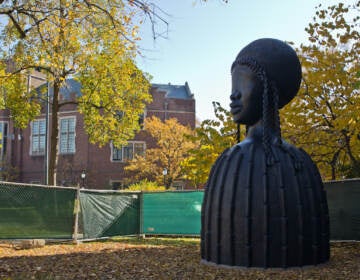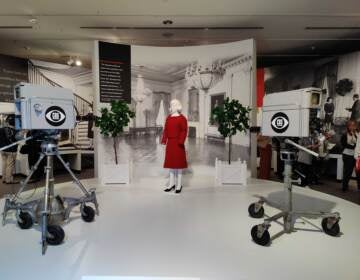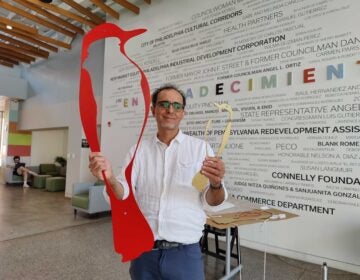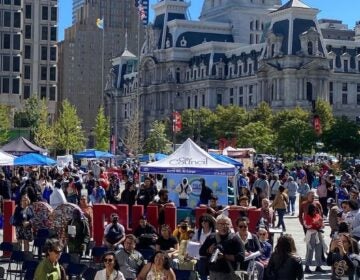New exhibition at Taller Puertorriqueño takes a deeper look at Puerto Rico’s struggles
Antonio Martorell, 83, installed a tropical forest inside Taller Puertorriqueño in North Philadelphia for an exhibition about the island’s woes.

In a new exhibition at Taller Puertorriqueño, Puerto Rican artist Antonio Martorell uses his art made from recycled trash and debris to make a comment about Puerto Rico’s government bonds downgraded to “junk” status in 2014. (Peter Crimmins/WHYY News)
Taller Puertorriqueño has brought a Puerto Rican forest into its gallery in North Philadelphia. The exhibition “A/Restos” is a facsimile of the island’s tropical rainforest that reflects the environmental, political, and economic woes Puerto Rico has suffered in recent years.
“I think all forests are like churches,” said Antonio Martorell, 83, one of Puerto Rico’s most prolific and iconic contemporary artists. “I was fortunate to visit when I was very young, when I lived in Long Beach, California, I visited quite a bit the Sequoia Forest. It was the greatest cathedral I’d ever been to. It was all inspired. You could do nothing but hold your breath.”
The Puerto Rican and Latino cultural center on 5th Street asked Martorell to install his giant trees printed on sheets of recycled felt batting. The trees were printed with recycled materials: crushed soda cans were dipped in orange paint to create the fiery foliage of a Flamboyán “Flame” tree, disassembled pieces of discarded furniture were inked and pressed into felt to create fallen tree limbs. Paper fans were used to print the image of pine needles.
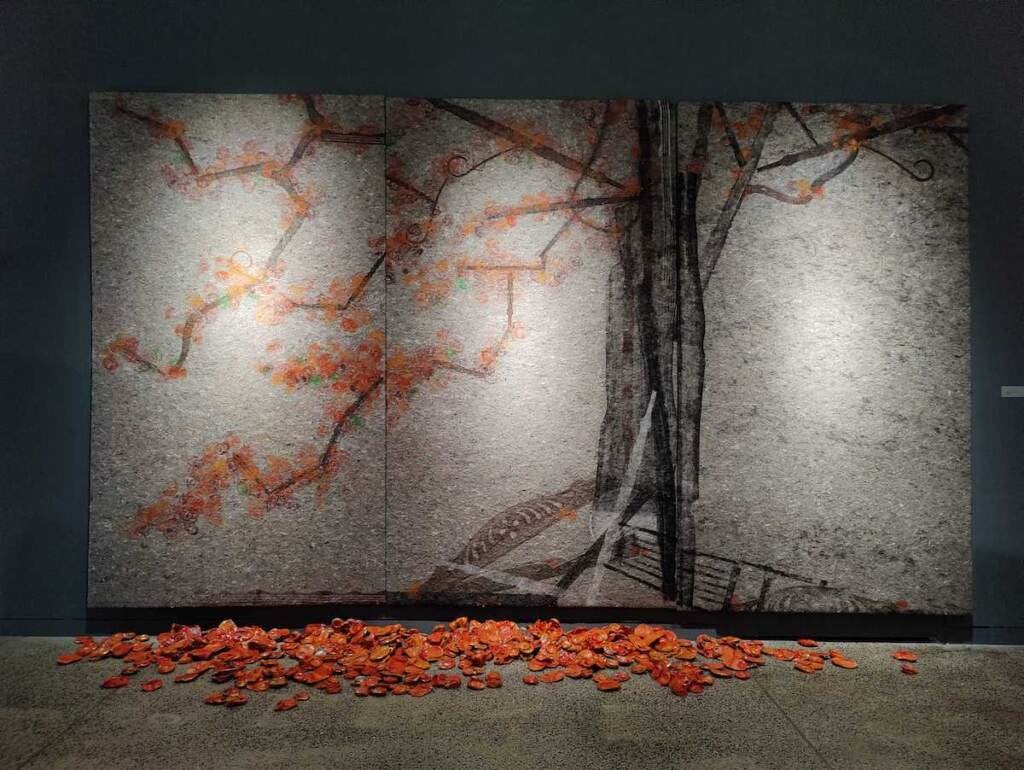
Martorell had started making these large-scale tree prints several years ago when Puerto Rico’s economic problems escalated. In 2014 several credit agencies downgraded Puerto Rico’s bond issues to “junk” status. That triggered the U.S. Congress to assume control of Puerto Rico’s budget and sent the island into bankruptcy proceedings, unable to pay more than $70 billion in debt.
After eight years of austerity measures that have crippled the island’s economy and made it unable to recover from natural disasters such as Hurricane Maria, Puerto Rico finally exited bankruptcy proceedings in March.
Martorell’s work, highlighting recycled trash and debris, refers to Puerto Rico’s economic “junk” status.
“I am a circumstantial artist,” he said. “Because I always answer to circumstances.”
“I am a degenerate artist because I belong to no generation,” he added. “I am 83 years old and I’m responding now to circumstances, now. I’m using the language of today. Don’t pigeonhole me in any generation.”
“I am a superficial artist because I love surfaces,” he continued. “I work with them. I establish a dialogue with them.”
Martorell said his images are meant to be beautiful as well as timely, but after Hurricane Maria struck in 2017, devastating Puerto Rico and deforesting much of the island, he said his work with trees became prophetically gloomy.
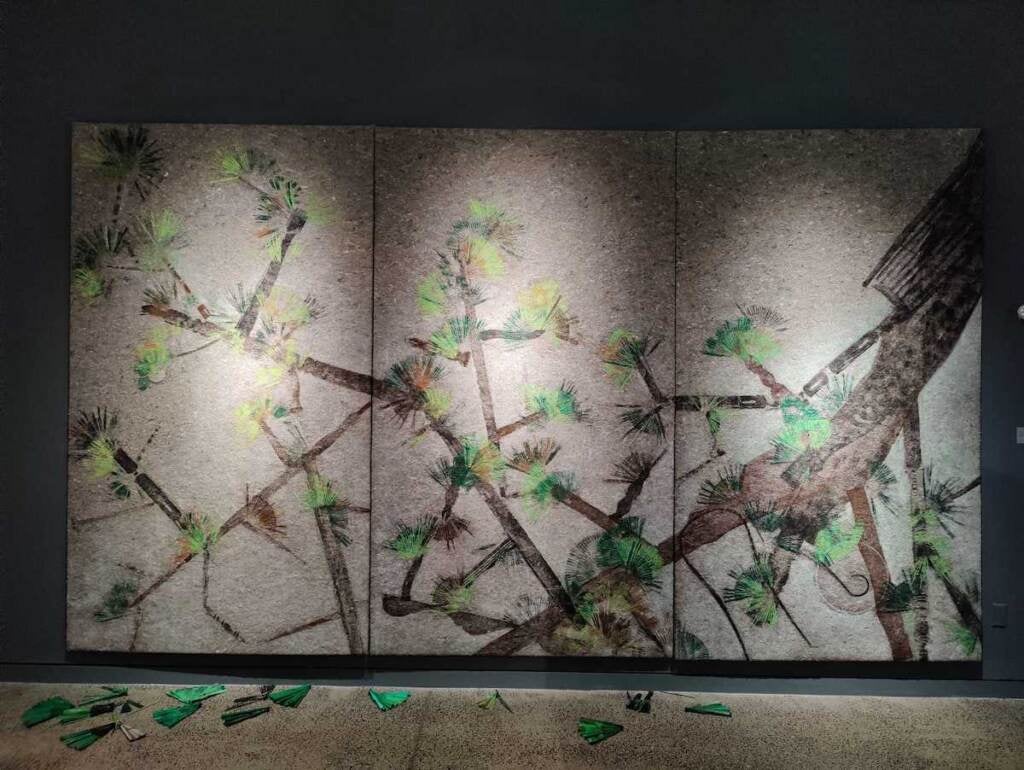
He is smitten by the manufactured felt surfaces with their own texture and color variations that the artist cannot control. The detritus of the printing process are scattered beneath the huge 10-foot tall prints, creating a kind of forest floor: crushed aluminum cans resembling fallen leaves and furniture parts resembling fallen logs.
“In order to communicate terrible things, tragic circumstances, you must do it in a beautiful, playful, attractive way,” he said. “It must have a seductive nature to it, because if enough people shy away from it, you will never get across what you want to say.”
At the center of A/Restos is Martorell’s current work, which more directly criticizes Puerto Rico’s government. A huge wall panel lists numbers, starting at one and going up into the several hundreds. Each is written in a calligraphy of his own invention, with digits nestled inside each other.
The numbers are the dead from Hurricane Maria.
“The government lied about it for months, saying there were only 64 [dead]. We knew there were thousands because people were dying all around us. I decided to take them into account,” Martorell said. “The government was expert in trying to hide the number of dead because that would be recognizing their irresponsibility in answering the disaster.”
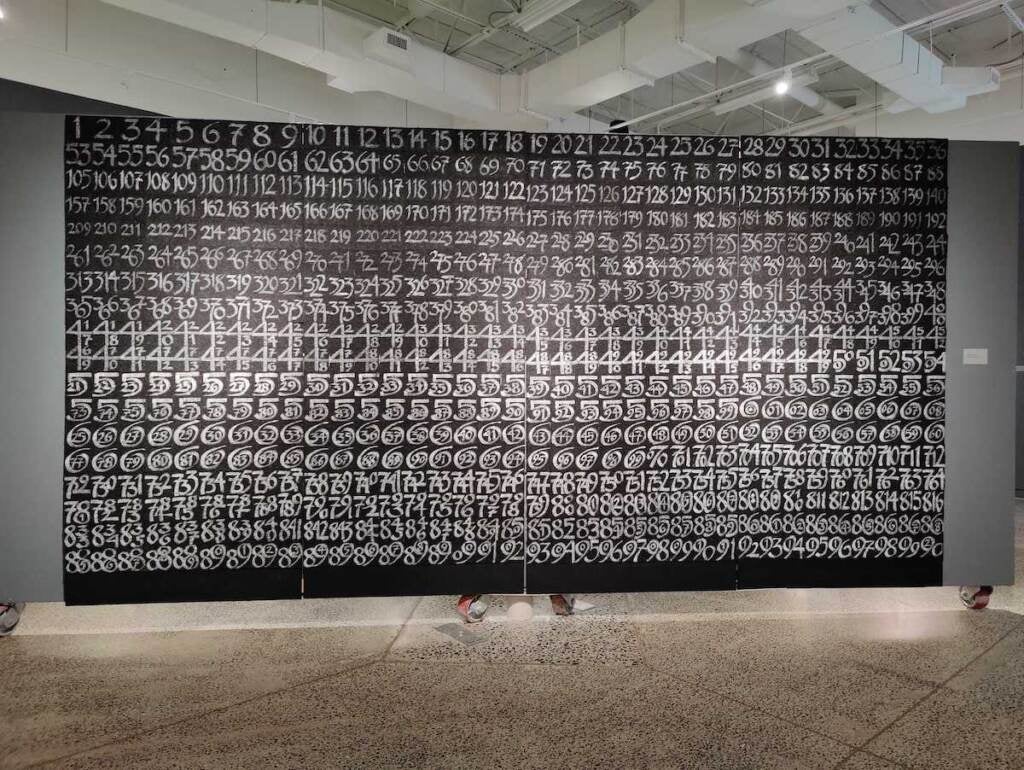
The deaths being counted in his works go beyond the natural disaster, to include the man-made disaster of Puerto Rico’s unreliable power grid that got knocked out during Hurricane Maria. Martorell included more people who died in the weeks following the storm from lack of power.
Martorell said he learned at the beginning of his career as an artist six decades ago that a Puerto Rican artist must be responsible, “and being responsible is being able to respond.” He and a group of collaborating artists work together to use material they have at their disposal and rework it into art about contemporary issues.
“We believe in making something out of nothing, making life come forth,” he said. “When we say in Spanish desgracia, or disgrace. We take out the first syllable – ‘des’- and we keep the grace.”
A/Restos will run at Taller Puertorriqueño until September 18.

Get daily updates from WHYY News!
WHYY is your source for fact-based, in-depth journalism and information. As a nonprofit organization, we rely on financial support from readers like you. Please give today.



